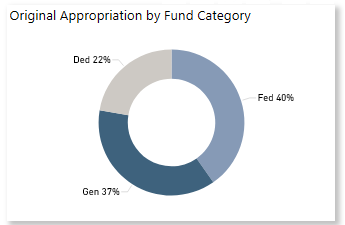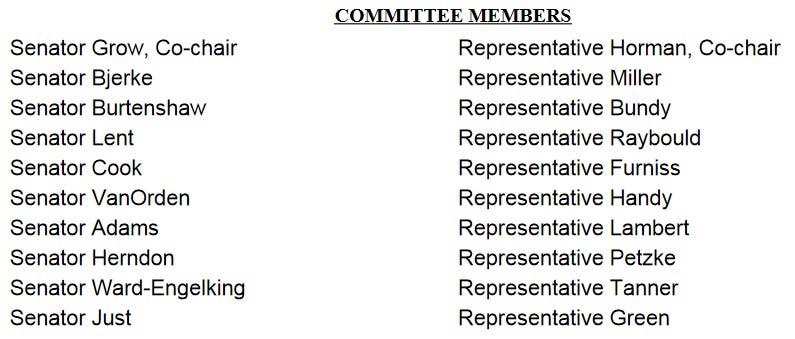According to the Idaho Constitution, our Legislature has exactly one job: pass a balanced budget that funds the government for another fiscal year. Sure, lawmakers can pass other bills, but the only statutory requirement is to pass the budget. Legislators cannot go home until that is done. Programs such as K-12 education, which are constitutionally mandated, must be funded.
The job of crafting budgets for every government department, division, and agency rests with the Joint Finance-Appropriations Committee (JFAC), which is made up of ten members of the Senate and ten from the House. The Senate Finance Committee and the House Appropriations Committee meet and vote together, turning budgets into bills that are then sent to the Senate and House floors for approval, then to the governor for his signature.
Many have complained in the past that JFAC was nothing more than a rubber stamp for the governor’s office. This has started to change in recent years, as members of the committee have taken a deeper interest in examining budget line items to ensure their line up with legislative priorities.
Historically, JFAC has started each session by receiving the governor’s budget request. In the following days and weeks they hear from the heads of nearly every state department and agency, who usually come hat in hand begging for more money. However, since JFAC is ultimately responsible for producing a budget for the state, its members have the authority to create that budget from scratch. Our branches of government are coequal, so they have the freedom to look at the governor’s proposed budget as a suggestion rather than an order.
To pass a balanced budget, JFAC must make an educated guess about the next fiscal year’s revenue. If they estimate too high, the state risks running out of money — unlike the federal government, Idaho cannot print money or go into debt. If they estimate too low, the state could end up with a surplus. House Bill 292, passed in 2023, established a mechanism to return surplus tax revenue to citizens as property tax relief.
This year, JFAC will begin meeting before the legislative session to review agency budget requests early. Agencies requesting more tax dollars will need to outline specific goals, which can be evaluated next year to assess how the funds were used.
Starting last session, JFAC members broke off into work groups to tackle various budgets, combing through them line by line to determine what are the highest priorities. Every agency believes that its needs are the most important, so it’s imperative for our lawmakers to take an objective and dispassionate look at their operations.
Regular citizens rarely have the opportunity to address JFAC directly, so taxpayer concerns often go unheard. Department heads present reasons for increasing their budgets, but it falls to JFAC members to scrutinize these requests and push back when necessary. That’s why it’s crucial to communicate directly with your legislators. If the only feedback they receive is from agencies justifying why they need more funding, it will be harder for them to say no.
Appropriations have increased tremendously over the past ten years. The Covid era saw huge inflows of federal funds which padded the budget by double digit percentages in fiscal years 2022 and 2023. Appropriations more than doubled over the last ten years, and increased by 67% since Gov. Brad Little’s inauguration.
These appropriations combine Dedicated Funds, which are permanent appropriations often with their own revenue sources such as hunting and fishing licenses or endowment lands; the General Fund, which is all other state revenue and yearly appropriations, and Federal Funds, which are grants from the federal government for programs such as Medicaid and free and reduced school lunches.
For fiscal year 2024, 22% of appropriations were dedicated funds, 37% were from the general fund, and 40% came from the federal government.
During the 67th session of the Idaho Legislature, which took place from 2023-24, JFAC was co-chaired by Sen. C. Scott Grow and Rep. Wendy Horman. The Senate Finance Committee was composed of eight Republicans and two Democrats, while the House Appropriations Committee was nine Republicans and one Democrat.
If you’re familiar with the Idaho Legislature, you should hear warning bells in your mind already. Only a few members of the joint committee could reasonably be called “fiscally conservative.” Four of the members on the Senate side were themselves chairs of other committee, which potentially created conflicts of interest since they were involved with funding the very policies their committees passed.
When a normal bill fails on the House or Senate floor, it is dead, and can only be reintroduced as a new bill with a new print hearing. Since passing a budget is required by law, a negative vote on a budget bill by the House or the Senate sends that budget back to JFAC for revision. In 2023, the House rejected a budget bill to fund the Division of Welfare, and so JFAC revised it to cut more than $100 million from Medicaid. That bill was subsequently passed by both chambers.
It was nevertheless rare for the House or Senate to reject a budget bill, especially since by the time budgets are on the floor, lawmakers are usually champing at the bit to finish their work and go home. There is also the rhetorical danger of voting against a budget for law enforcement, for example. One legislator might believe a single line item is too big, and vote against the bill for that reason, but then his opponents will tell voters that he “voted against the police”.
For these reasons and others, co-chairs Grow and Horman decided to shake things up this year by creating a process to pass maintenance budgets early in the session, leaving more time to evaluate each agency’s new line item requests for the upcoming fiscal year.
The maintenance budget process rolled up the previous fiscal year’s base spending into ten omnibus bills, allowing the Legislature to quickly approve them early in the session. The rationale is that these budgets were already passed during the previous legislative session and signed by the governor, so it doesn’t make sense to spend too much time debating them. Instead, more time can be spent on the line item increases requested by each agency, which can then be submitted as individual bills.
These line item increases are different from supplemental requests, in which agencies ask for additional money above and beyond their original budgets. These supplements can be particularly insidious, as they obfuscate the total spending by each department. According to Sen. Grow, JFAC received 115 supplemental requests in 2023, but only just over a dozen in 2024.
While the new process did not result in overall cuts in spending — at least not yet — it did allow members of the House and Senate more freedom to vote against the additional requests, having already voted to keep the doors open and the lights on at the various agencies. The Senate rejected a budget bill this year for the first time in recent memory, asking JFAC to remove the Division of Welfare’s plan to implement Summer EBT at the behest of the Biden/Harris administration.
Not everyone was on board with the new process, however. Gov. Little expressed some misgivings to the press, and Senate President Pro Tempore Chuck Winder apparently maneuvered behind the scenes to stymie it. On Friday, February 2, 2024, with co-chair Horman out sick, nine Republicans on JFAC joined with the three Democrats to neuter the new process by passing old-style budgets in place of the line item increases. Over the course of more than two hours, Grow and Sens. Bjerke, Adams, Herndon, and Reps. Miller, Lambert, and Tanner were outvoted on every motion.
This set up a showdown on the House and Senate floors. Speaker Mike Moyle supported the new process, and was eventually able to bring one of the new additional budget bills to the House floor for a vote. 20 Republicans joined the 11 Democrats to vote against the bill, expressing their disapproval of the new process as a whole, but it nevertheless passed 38-31.
Seven of the twenty Republicans who voted against the new process will not be returning to the Legislature next year.
So what must happen to rein in spending in Idaho?
First, we need fiscally conservative legislators who are willing to serve on JFAC. It’s a very busy committee, meeting every day of the week, first thing in the morning, and requiring a lot of additional work combing through budgets and communicating with stakeholders. It’s not an “easy A” committee, that’s for sure.
Second, we need leaders in the House and Senate to appoint those fiscally conservative legislators to JFAC. Speaker Mike Moyle will choose the members of the House Appropriations Committee, while whomever is elected Senate President Pro Tempore will choose the Senate members. That makes the vote in December by the Senate Republican Caucus for pro tem all the more important. The next pro tem will choose not only the committee, but the chair, which means that continuing the maintenance budget process, as well as any chance of cutting spending at all, rests on that vote.
Sen. Grow, current co-chair of JFAC, announced his run for pro tem just hours after Sen. Winder was ousted in the primary. He says he’s running to protect the new process. Others have been quietly making calls and whipping votes as well, though they have not officially announced their own campaigns.
So what can you do as an informed voter and citizen?
First, become familiar with the budget process. My friends at the Idaho Freedom Foundation recorded a great video earlier this year explaining the process, as well as how their Spending Index tracks votes on budget bills. (The Spending Index has been modified heading into the 2025 session to account for the new maintenance budget process.)
Next, talk to your legislators. If any of your district’s three lawmakers sat on JFAC this past session, then maybe ask if you can sit down for coffee and learn more about their perspective. (My district is lucky enough to have two JFAC members!) Urge them to consider the taxpayer as they look ahead to the 2025 budget. If you don’t know who your legislators are, then click here to find out. Even if your senator or representatives are not on JFAC, they can give you insight into the legislative process and take your concerns to their colleagues.
Finally, call up your state senator and talk about the upcoming pro tem vote. Make sure they see fiscal responsibility on JFAC as a high priority for whomever will be the next leader of the Senate.
Cutting spending and cutting taxes are two sides of the same fiscal coin. The state will spend whatever we as taxpayers provide, but reducing spending will also drive tax cuts by showing that the government doesn’t need its current billions in funding. By learning about JFAC and the budget process, we can better hold our elected representatives accountable for every penny.








